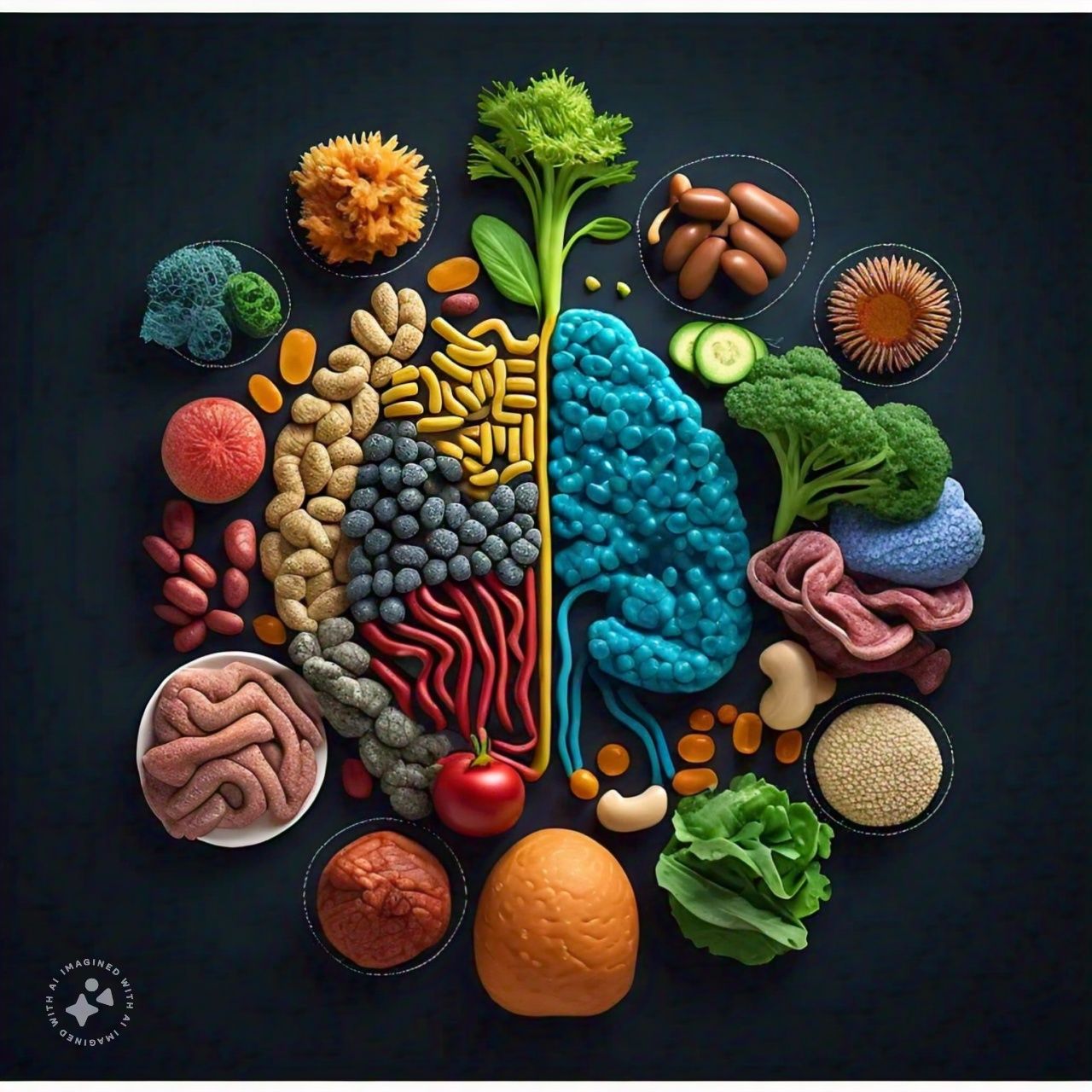Introduction
In recent years, “gut health” has gained significant attention. The gut, often called the “second brain,” profoundly influences overall well-being. This heightened focus on the gut is due to its significant impact. A well-functioning digestive system is crucial. It ensures effective nutrient absorption. It also supports a robust immune system and optimal mental health. Additionally, it helps prevent chronic diseases. In this blog, we will explore the intricacies of gut health. We will uncover its connections to various aspects of well-being. We will also discuss practical strategies to support and maintain a healthy gut. These include dietary adjustments and lifestyle changes. Furthermore, we will look into the potential benefits of probiotics and prebiotics.
Understanding Gut Health
The Gut Microbiome
The gut microbiome, an ecosystem of trillions of microorganisms including bacteria, viruses, fungi, and other microbes, resides within our digestive tract. This complex community plays a crucial role in numerous bodily functions, making it integral to our overall health.
Gut-Brain Axis
The gut-brain axis is a sophisticated and bidirectional communication system that connects the gastrointestinal tract and the brain. This intricate relationship is facilitated by multiple pathways, including the vagus nerve, the enteric nervous system, and a variety of biochemical signaling molecules such as neurotransmitters and hormones.
Immune System Support
About 70% of the immune system resides in the gut-associated lymphoid tissue (GALT). This highlights the gut’s crucial role in immune health. The GALT is a network of immune cells and tissues in the gut lining. It monitors and responds to pathogens entering through the digestive tract.
Inflammation and Autoimmune Diseases
An imbalanced gut microbiome, often referred to as dysbiosis, can have profound effects on overall health, one of the most significant being chronic inflammation. The gut microbiome, a complex community of trillions of microorganisms, plays a crucial role in regulating the immune system and maintaining homeostasis.
Gut Health and Mental Well-being
The Role of Neurotransmitters
The gut’s role in producing neurotransmitters, including serotonin, underscores its profound influence on our emotional and psychological well-being. Serotonin, often referred to as the “feel-good” hormone, is a neurotransmitter crucial for regulating mood, sleep, and appetite. Remarkably, approximately 90% of the body’s serotonin is synthesized in the gut, specifically in enterochromaffin cells located in the gastrointestinal lining.
Gut Dysbiosis and Mental Health Disorders
Recent research has increasingly highlighted the intricate connection between gut dysbiosis and mental health disorders, including depression, anxiety, and schizophrenia. Dysbiosis refers to an imbalance in the gut microbiome, where there is a disruption in the diversity and composition of beneficial bacteria compared to harmful ones.
Gut Health and Chronic Diseases
Metabolic Syndrome
Metabolic syndrome encompasses a constellation of conditions that collectively increase the risk of cardiovascular disease, diabetes, and other health complications. These conditions include obesity, insulin resistance, high blood pressure, and abnormal cholesterol levels. Emerging research suggests that the gut microbiome plays a pivotal role in the development and progression of metabolic syndrome.
Cardiovascular Health
The gut microbiome significantly influences cardiovascular health. It does this through mechanisms like producing metabolites. One key metabolite is trimethylamine N-oxide (TMAO), which links gut health to heart disease risk.
Factors Affecting Gut Health
Diet and Nutrition
Diet is a pivotal factor in shaping the composition and function of the gut microbiome, influencing overall health and well-being. A diet rich in fiber, fruits, vegetables, and fermented foods provides essential nutrients and substrates that support a diverse and balanced gut microbiome.
Prebiotics:
Prebiotics are non-digestible food components that serve as fuel for beneficial bacteria in the gut, promoting their growth and activity. Unlike probiotics, which are live beneficial bacteria themselves, prebiotics are indigestible fibers that pass through the upper gastrointestinal tract undigested.
Probiotics:
Probiotics are live beneficial bacteria and yeasts that are found naturally in fermented foods or can be consumed as supplements. These microorganisms have been shown to confer health benefits by supporting and maintaining a healthy balance of gut microbiota.
Antibiotics and Medications
Antibiotics are vital medications used to treat bacterial infections by killing harmful bacteria. However, their broad-spectrum action can also inadvertently affect beneficial bacteria in the gut microbiome.
Stress and Lifestyle
Chronic stress exerts significant effects on gut health, disrupting several key aspects of gastrointestinal function and the gut microbiome. One of the primary ways stress affects the gut is by altering gut motility, the movement of food and waste through the digestive tract. Stress can either accelerate or decelerate gut motility, leading to symptoms like diarrhea or constipation.
Practical Steps to Maintain Gut Health
Balanced Diet
Adopting a balanced diet that prioritizes whole foods, fiber, and fermented products is crucial for promoting and maintaining optimal gut health. This dietary approach ensures that the gut receives essential nutrients and fosters a diverse and balanced gut microbiome, which is integral to overall well-being.
Regular Physical Activity
Exercise benefits overall health and positively impacts gut health. Research shows regular physical activity promotes a diverse and healthy gut microbiome. This contributes to improved digestive function and overall well-being.
Stress Management
Managing stress effectively is paramount for promoting and maintaining gut health, given the intricate connection between the gut and the brain.
Chronic stress significantly impacts gut health. It alters the composition and function of the gut microbiome. Additionally, it increases intestinal permeability and exacerbates gut inflammation.
Adequate Hydration
Staying hydrated is crucial for digestive health. It supports the intestinal mucosal lining and balances beneficial gut bacteria. Adequate hydration maintains proper mucosal integrity, protecting against pathogens and toxins.
Mindful Eating
Practicing mindful eating involves adopting a conscious and present approach to the act of eating, focusing on the body’s hunger and fullness cues, chewing food thoroughly, and creating a relaxed eating environment.
The Future of Gut Health Research
The field of health research is rapidly evolving. Advances in technology, such as high-throughput sequencing and metagenomics, are providing deeper insights into the complexities of the gut microbiome. Future research may uncover personalized dietary recommendations based on individual microbiome profiles, leading to more targeted and effective interventions for maintaining GIT health.
Gut Microbiome Transplants
Gut microbiome transplants, also known as fecal microbiota transplants (FMT), represent a novel therapeutic approach. They are being investigated for treating various conditions, particularly Clostridioides difficile infections (CDI) and inflammatory bowel disease (IBD).
The development of targeted probiotics and prebiotics represents a promising frontier in healthy gut research, offering personalized approaches to address specific imbalances in the gut microbiome. Probiotics are live microorganisms that, when administered in adequate amounts, confer health benefits to the host by modulating the composition and activity of the gut microbiota.
Conclusion
The gut microbiome’s role in overall wellness is increasingly recognized as fundamental, influencing not only digestive health but also immune function, mental well-being, and the prevention of chronic diseases. Comprising trillions of microorganisms, the gut microbiome interacts with various bodily systems, contributing significantly to our overall health. In conclusion, recognizing the profound impact of the gut microbiome on our health underscores the importance of prioritizing healthy gut as a cornerstone of overall well-being.
Learn about Nutrient Symphony: Power & Pleasure of Healthy Foods
About gut health: https://www.healthline.com/health/gut-health




Leave a Reply